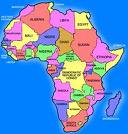Imperial Quest for Riches Fuels Africa’s “Civil Wars”

Clear proof of the decline of the global profit system is the agonizing poverty and conflict in today’s Africa. With the worldwide economic crisis, competition is intensifying between big capitalists engaged in frenzied buying of land and resources throughout Africa. Their scramble for the bounty of this most exploited continent is stoking bloody civil wars and untold human misery.
In 2009, China joined the profiteers to become the biggest investor in Africa. So the old colonial powers, U.S., France and Britain, are heightening military action to reinstate their economic dominance. They call their interventions “humanitarian,” as in Libya. But it all adds up to colonialism, in grim new clothing.
Currently, major struggles are raging in Ivory Coast, Sudan and the Democratic Republic of the Congo.
Ivory Coast, France, and cocoa.
Côte d’Ivoire began its national existence as a colony of France, and has been in its orbit ever since, despite formal independence in 1960.
As the largest producer of cocoa beans in the world, Ivory Coast is one of the most developed countries in West Africa. Nearly two-thirds of its pivotal rural labor force in the north consists of immigrant workers, who suffer the heaviest unemployment, poverty and dis-crimination.
Headlines early this year on the disputed presidential election in November 2010 and the defeated president refusing to leave office were only part of the story.
Fighting between southern and northern strongmen has gone on since economic crises in the 1980s. Civil war broke out in 2002. France, with U.N. cover, intervened in 2005 to keep southern-based Laurent Gbagbo in power, defeating northerner Alassane Ouattara. Hardly a revolutionary, Ouattara is a former IMF deputy director who oversaw the impoverishment of all of sub-Saharan Africa through IMF’s neo-liberal policies.
When Gbagbo dramatically increased trade with China, France switched sides. In the long-delayed 2010 elections, each side claimed it won by just over 50 percent. Both camps attacked journalists and murdered supporters of the other. France’s “humanitarian” role was to bomb and depose Gbagbo and install Ouattara. French businessmen and President Sarkozy attended Ouattara’s inauguration, and 1,600 French troops will remain in the country permanently.
One of Ouattara’s first acts was to jail without charges and torture Basile Mahan Gahé, the general secretary of the trade union center Dignité. To help protest this action, go to http://cms.iuf.org/?q=node/913.
Sudan, Britain, U.S. and oil.
Britain colonized Sudan in the 1890s, administered the north and south separately, and fostered rivalries between them to divide and conquer. It won independence in 1956, the largest country on the continent of Africa. By the 1970s, the U.S. was the replacement impe-rialist power, and funded a right-wing Islamist takeover of the government as a “bulwark against communism.”
Today, black gold defines the USA’s interest in Sudan. The south has most of the country’s large oil reserves, which have been the source of two civil wars and the recent secession of South Sudan on July 9, 2011.
China currently dominates the oil industry, and buys much of its product. U.S. oil moguls want to displace the Chinese, so the American government spent billions arming the Sudan People’s Liberation Movement (SPLM) of the south.
Sadly, splitting the country solves nothing. U.N. “peacekeepers” and, since 2008, the U.S. AFRICOM military command, have already ensured U.S. and European Union control. The border between the two Sudans has not even been determined, a guarantee of future war.
Now the struggle over the oil-rich region between Sudan and South Sudan has shifted fighting to this middle region, as the northern government tries to hold on to the territory by force.
In Darfur, the western region, rivalries between herders and farmers continue to be driven by terrible poverty, vicious government re-pression, and draughts caused by global warming. (For more, see “Tragedy in Darfur: Unraveling the real causes” at http://www.socialism.com/drupal-6.8/?q=node/595.)
Congo, still heart of darkness.
The Democratic Republic of the Congo (formerly Zaire) is haunted by the most horrific history of colonial exploitation. King Leopold II of Belgium took it over in 1885 as his private property. He laid waste to the country with forced labor so extreme that half the people died of violence, starvation and disease, more than in the Nazi death camps of World War II. Limb amputations and other barbarities enforced collection of rubber, palm oil and ivory. Belgium, the U.S. and U.N. helped assassinate the founder of the nationalist movement and the Congo’s first elected president, Patrice Lumumba in 1961.
The country has an estimated $24 trillion worth of gold, copper and other minerals, among the richest deposits in the world. Yet its peo-ple are among the poorest.
Starting in the late 1990s, when the Rwandan civil war spilled over its eastern border, the country has been mired in the largest war in modern African history, with seven countries intervening. It is the bloodiest war since World War II, with a death toll of 5.4 million peo-ple. Yet the U.S., France and other capitalist regimes spare little humanitarian concern here. Minerals still make it to market through tribal militias or loosely affiliated “army” units, which control the mines. Naturally, fighting still goes on despite a 2003 ceasefire and a permanent force of – you guessed it – U.N. “peacekeepers.”
Women are particular targets in this “rape capital of the world.” One estimate puts the number molested daily at over 1,100. Many chil-dren are kidnapped by troops and forced to become soldiers, the girls forced into domestic and sexual servitude, and often abandoned afterwards by their communities.
A real African independence.
Over two-thirds of the least developed countries in the world are in sub-Saharan Africa, the product of insatiable looting from early colonialism through late capitalism. Real independence, as well as decent lives for its peoples, will only come with the end of this predatory, destructive system.
Send feedback to Megan Cornish at [email protected] .

